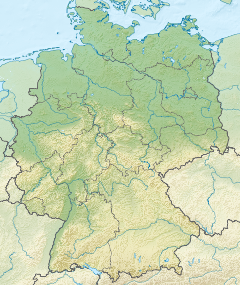You can help expand this article with text translated from the corresponding article in German. (September 2011) Click [show] for important translation instructions.
|
The Ach, also called Aach, is a river located in Baden-Württemberg, Germany. It flows into the Blau in Blaubeuren.
| Ach | |
|---|---|
 | |
| Location | |
| Country | Germany |
| State | Baden-Württemberg |
| Physical characteristics | |
| Mouth | |
• location | Blau |
• coordinates | 48°24′57″N 9°47′10″E / 48.41583°N 9.78611°E |
| Length | 10.2 km (6.3 mi) [1] |
| Basin features | |
| Progression | Blau→ Danube→ Black Sea |
Geography
editSource
editThe river Ach has its source west of Schelklingen in the Achursprung (535 m above sea level), a karst spring at the Dreikönigsmühle and about 500 m south of the monastery Urspring. It is a circular, bluish shimmering spring pot with an average flow of 440 litres per second (min. 110 L/s, max. 1,200 L/s).
Course
editAfter only about 100 m of river, the longer and more water-rich Urspring, which has its source near the monastery Urspring, flows into the river on the left side. The Ach runs along its entire length in a valley of the Urdonau. Until Schelklingen it flows in an easterly direction, but then turns to the northeast. Before its mouth, the Ach flows around the Bruckfels near Weiler at the Geißenklösterle and the Weilerhalde in two wide river loops before it flows through Blaubeuren and joins the still young Blau at 515 m above sea level.
On its 10.2 km long path the Ach falls 20 m in height, which corresponds to a mean bed gradient of 2 ‰
Auf ihrem 10,2 km langen Weg fällt die Ach um 20 m Höhe, was einem mittleren Sohlgefälle von 2 ‰ entspricht.
Sights and structures
editIn Schelklingen are the ruins of Hohenschelklingen Castle and Saint Afra's Chapel with its Gothic fresco cycle. In the Ach valley are the Hohler Fels, one of the largest caverns in the Swabian Jura and south Germany, in which archaeologically important discoveries were made. On the opposite side of the valley stands the Sirgenstein, a twenty-metre-high rock outcrop on which there are traces of a Stone Age cave dwelling and a medieval castle. Further down the valley are the ruins of Günzelburg Castle and another Stone Age cave, Geißenklösterle, and yet another Stone Age cave, Brillenhöhle Cave. In Blaubeuren are the Blautopf and, nearby, the former Blaubeuren Abbey with its abbey church, the ruins of the Rusenschloß and the hammer mill.
See also
editReferences
edit
